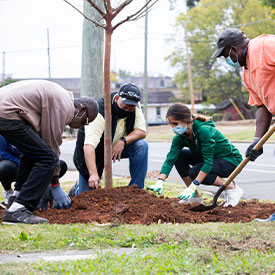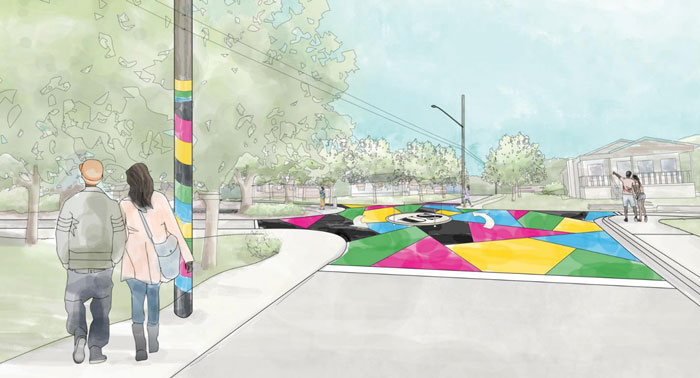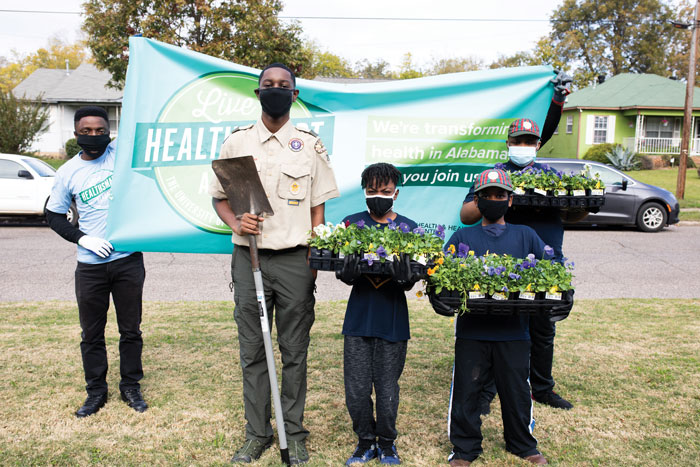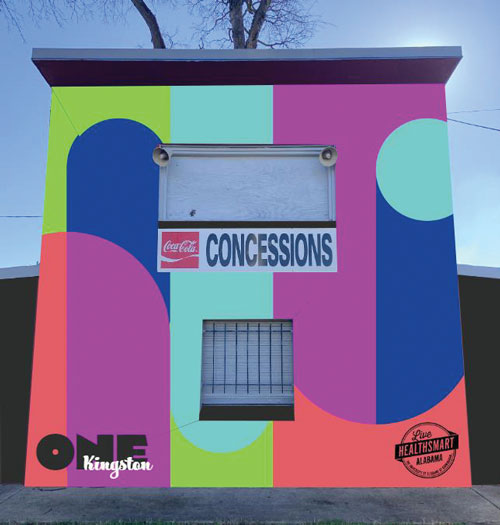 The road to better health runs more smoothly now in the Kingston and Titusville neighborhoods of Birmingham. Corporate supporters recently joined forces with UAB’s Live HealthSmart Alabama and the City of Birmingham to transform the “built environment” in the two neighborhoods to promote active, healthy lifestyles. That means residents are enjoying fresh new sidewalks, bike lanes, improved green spaces, and brighter streets, among other upgrades.
The road to better health runs more smoothly now in the Kingston and Titusville neighborhoods of Birmingham. Corporate supporters recently joined forces with UAB’s Live HealthSmart Alabama and the City of Birmingham to transform the “built environment” in the two neighborhoods to promote active, healthy lifestyles. That means residents are enjoying fresh new sidewalks, bike lanes, improved green spaces, and brighter streets, among other upgrades.
“In town halls, community members said they wanted to make physical activity more accessible,” says Mona Fouad, M.D., principal investigator of Live HealthSmart Alabama and director of the UAB Minority Health & Health Disparities Research Center (MHRC). “These improvements can help make exercise and active living easy choices, which can contribute to the adoption of healthy habits throughout these communities.”
Live HealthSmart Alabama, the winning project of UAB’s inaugural Grand Challenge competition, was developed by the UAB MHRC to improve the health of Alabamians by addressing policies, systems, and built environments that can contribute to better health outcomes. Part of the university’s strategic plan, “Forging the Future,” the UAB Grand Challenge is intended to unite university activities across silos and throughout different schools, forge new partnerships, and impact the community. Live HealthSmart Alabama, proposed by Fouad and multiple partners, was the winning proposal among 77 submitted for the inaugural Grand Challenge grant in 2019.
 The Titusville Neighborway uses strategies and tactics, like the traffic circle pictured here, to reduce traffic, slow car speed, and improve safety and biking/walking on residential streets. It supports Live HealthSmart Alabama’s goal of encouraging healthy outdoor activities in underserved areas.
The Titusville Neighborway uses strategies and tactics, like the traffic circle pictured here, to reduce traffic, slow car speed, and improve safety and biking/walking on residential streets. It supports Live HealthSmart Alabama’s goal of encouraging healthy outdoor activities in underserved areas.
More than a dozen companies and organizations signed on to support Live HealthSmart Alabama’s work improving the built environments in Kingston and Titusville, communities with rich histories but a lack of resources. A generous gift from Brasfield & Gorrie funded the construction and repair of sidewalks in Kingston. Walkers can now enjoy a safe, smooth path connecting homes with Stockham Park, new bus shelters, and “micromobility stations,” where residents can borrow bicycles and electric scooters.
“Building strong communities is a key part of Brasfield & Gorrie’s purpose, and health is fundamental to strong communities,” says Jim Gorrie, the company’s chief executive officer. “We’re honored to play a part in supporting this important initiative and contributing to improvements in the built environment that will help advance health and wellness in our communities.”
In Titusville, the Birmingham Sunrise Rotary Club has left a living, growing legacy with a gift to support the planting of 48 trees along First Street South. As the trees mature, they will provide welcome shade for walkers while adding beauty to the neighborhood. Another exciting development is the Titusville Neighborway, made possible with the support of Dunn Construction, Vulcan Materials Company, and the City of Birmingham. The Neighborway is a street redesigned to encourage biking and walking, reduce traffic, and slow the speed of cars. It runs the length of the community to Memorial Park, with micromobility stations at both ends.
 Live HealthSmart Alabama, in partnership with Birmingham Sunrise Rotary Club, hosted a tree planting event in Titusville on November 9, 2020.
Live HealthSmart Alabama, in partnership with Birmingham Sunrise Rotary Club, hosted a tree planting event in Titusville on November 9, 2020.
“Enthusiastic support of the business community for the UAB Grand Challenge demonstrates its desire and commitment to improve the lives of Alabamians in tangible and measureable ways. Service to our communities is a cornerstone of the Dunn Companies’ values, and we are proud to invest in supporting UAB and the City of Birmingham in improving the lives of its citizens through healthier living in the built environment,” says Craig Fleming, president of Dunn Construction and chair of the Advisory Board of the UAB School of Engineering’s Department of Civil, Construction, and Environmental Engineering.
Other gifts—from John and Lynn Parrish, the DeBardeleben Foundation, Coca-Cola Bottling Company United, O’Neal Industries, and Steward Machine—have funded additional improvements for Titusville and Kingston. Alabama Power also upgraded street lighting, while the City of Birmingham installed high-visibility crosswalks (eliciting cheers from students at Kingston’s Hayes K-8 School).
The MHRC will collect data to gauge the impact of the changes on physical activity among residents. At the same time, two more Birmingham neighborhoods—Bush Hills and East Lake—will hold community and stakeholder meetings to discuss revamping their built environments to promote health.
 The concession stand at Stockham Kingston Park received a colorful new mural as part of Live HealthSmart Alabama.
The concession stand at Stockham Kingston Park received a colorful new mural as part of Live HealthSmart Alabama.
National Cement Company is supporting improvements in all four demonstration zones. “National Cement Company of Alabama and Kirkpatrick Concrete share a longtanding tradition of commitment to active involvement in community improvement projects in our local area and across the state,” says Spencer Weitman, president of National Cement Company of Alabama, Inc. “UAB’s initiative in pursuing this Grand Challenge opportunity speaks to their commitment to improving the lives of the local citizens of Birmingham by partnering with the local business community. Once complete, the combined phases of the project will enhance the local neighborhoods and the quality of life for the people living within the area impacted by the improvements, and we are proud to participate in this project and enthusiastically support it.”
“These projects are emblematic of the value of partnership in building our neighborhoods,” says Fouad Fouad, Ph.D., chair of the Department of Civil, Construction, and Environmental Engineering; director of UAB’s Sustainable Smart Cities Research Center; and leader of the Live HealthSmart Alabama Built Environment Team. “Under the leadership and guidance of UAB President Ray Watts, M.D., we brought together major organizations in Alabama to support the UAB Grand Challenge’s noble aim of improving health and wellness in our local communities. We strongly believe that these efforts will have a long-lasting effect on the well-being and health of our citizens.”
To learn more about Live HealthSmart Alabama, visit www.uab.edu/livehealthsmartal. To make a gift to Live HealthSmart Alabama, contact Christian Smith, director of development, at 205-934-1974 or christiannsmith@uabmc.edu. – Charles Buchanan